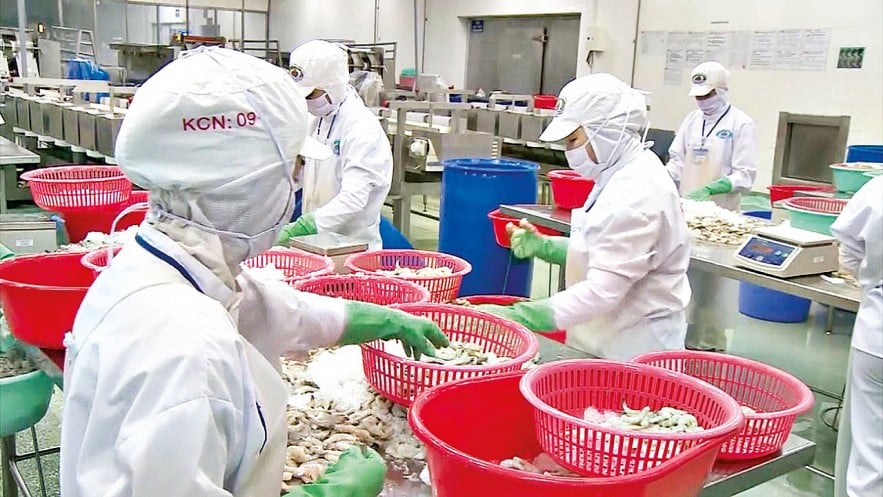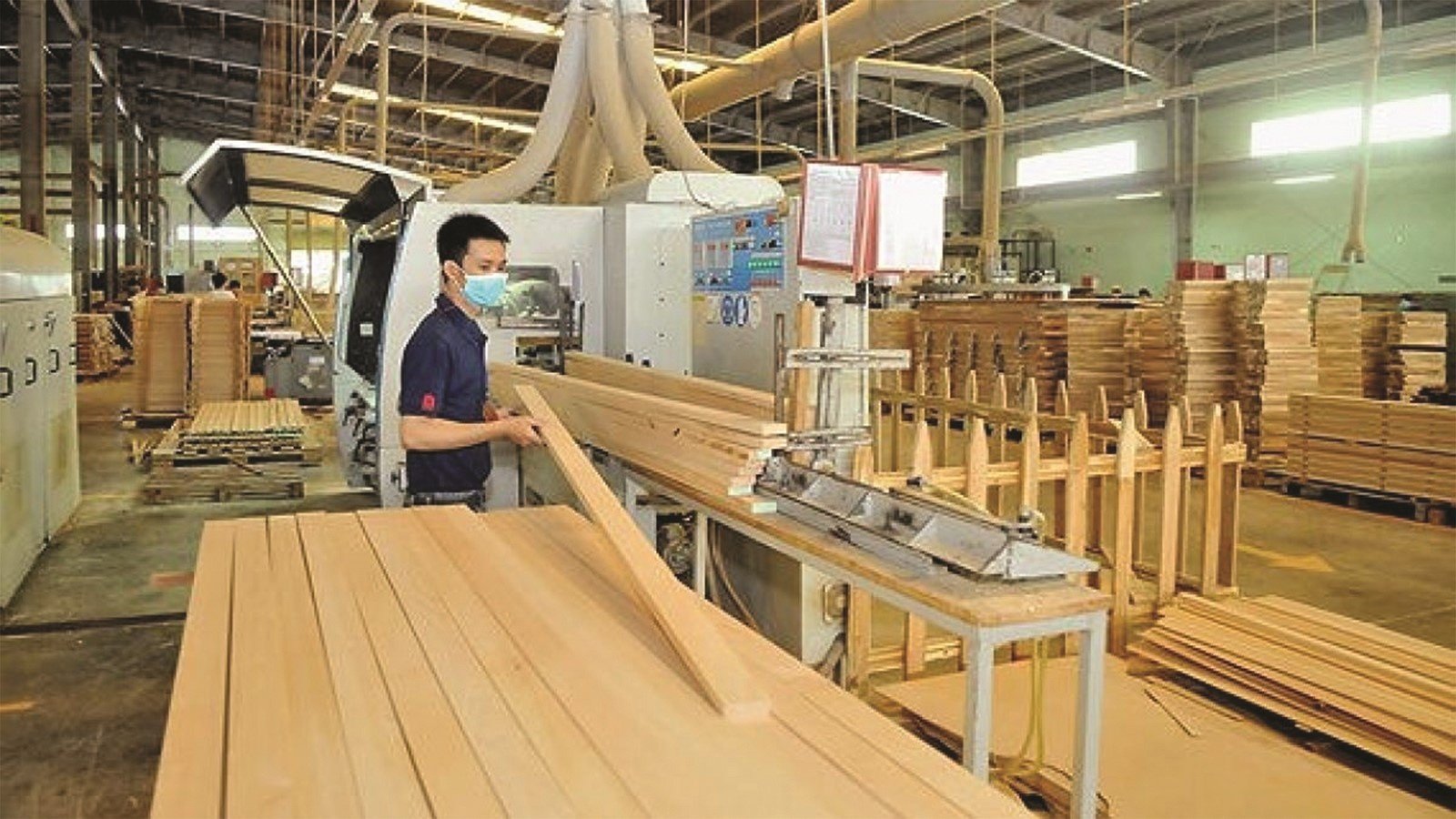November 21, 2025 | 12:52 GMT +7
November 21, 2025 | 12:52 GMT +7
Hotline: 0913.378.918
November 21, 2025 | 12:52 GMT +7
Hotline: 0913.378.918

Ngo Chung Khanh, Deputy Director of the Multilateral Trade Policy Department, shared at the seminar 'Green transformation - Urgent requirements of businesses exporting to the EU organized by Industry and Trade Magazine.
After three years of implementing EVFTA, trade between Vietnam and the EU has grown positively. With a mutually complementary commodity structure, advantages from EVFTA implementation have helped two-way trade in general and Vietnam's exports to the EU, particularly, grow impressively.
Vietnam's essential export products recorded 2 to 3-digit growth rates, such as textiles, footwear, seafood, agricultural products, etc. In particular, the utilization rate of C/O origin of goods issued by the exporting country to confirm that the item complies with regulations on a basis) incentives continuously increase.
However, since the third year of the EVFTA implementation roadmap, these advantages and results have been somewhat affected because the EU is applying higher standards and increasing quality requirements, especially in the environment and sustainable development... The latest is the EU Deforestation Regulation (EUDR).
With a series of these "green standards," Mr. Ngo Chung Khanh, Deputy Director of the Multilateral Trade Policy Department, Ministry of Industry and Trade, said that EVFTA is essentially an agreement that focuses heavily on sustainable development. EVFTA devotes an entire chapter to sustainable development. "Businesses that want to export to the EU sustainably need to pay close attention to this," he said.
In sustainable development, EVFTA is divided into two environmental and labor issues. Regarding the environment, the agreement addresses four main aspects: Climate change; Biodiversity; Sustainable forest management and trade in forest products; Management, development, conservation of marine life, and aquaculture.

After 3 years of implementing EVFTA, agriculture, forestry, and fishery businesses are considered to benefit the most.
According to Mr. Khanh, EVFTA also clearly specifies the tasks and obligations that exporters must bear in each aspect. For example, regarding climate change, the essence of the EVFTA is that the two sides will coordinate to share information and experience related to the carbon pricing mechanism and carbon emission reduction.
On that basis, businesses must select raw materials to ensure their production process is environmentally friendly, minimizing the use of fossil and harmful raw materials. In other words, manufacturers must "greenie the production process."
Regarding biodiversity, Vietnam and the EU must cooperate to prevent actions and production activities that affect biological conservation, especially preventing and minimizing illegal buying, selling, and exchanging of flora and fauna.
Leaders of the Multilateral Trade Policy Department emphasized the aspect of coordination in sustainable forest management and forest product trade. Along with related policies, such as EUDR, the EU, and Vietnam will coordinate to preserve and develop sustainable forests to limit and prevent products using illegal wood sources.
"Our businesses need to pay close attention in the production process, especially when importing wood, which must have a clear and legal origin for our products to be recognized in the EU market," Mr. Khanh said.
Regarding biodiversity and conservation of marine resources and aquaculture, Mr. Khanh recommends that businesses in the aquaculture process ensure procedures, standards, and regulations comply with the requirements of the EU to ensure certification in your market. At the same time, do not participate in or buy and sell products originating from illegal fishing, using sources and tools that cause damage to marine life.
Regarding labor issues, Mr. Ngo Chung Khanh shared that Vietnam has established a domestic consulting group, including representatives of independent organizations on labor and the environment, to advise the Governments of both sides to monitor and evaluate the implementation process of the Sustainable Development Chapter.
The contents mentioned include ensuring a working environment, not employing minors, and providing relevant benefits and benefits for workers.

Some businesses, including the wood processing industry, need to adapt to the EU's increasing requirements.
In the context of solid globalization, the Multilateral Trade Policy Department commented that EVFTA and new laws promulgated by the EU would have little or no impact on exporters but will mainly affect exporters imports, that is, primarily involving EU subjects and EU subjects will have to be responsible for managing their supply chains to ensure the requirements set by the EU.
Therefore, first of all, we need to pay attention to many EU regulations that do not directly target exports but directly target EU importers, that is, EU partners. The rules in the EUDR demonstrate this, as the task of appraising reports for products distributed and supplied in the EU belongs to importers.
Export businesses are not "relieved of pressure" under the new regulations, according to Mr. Khanh. Consumers' general trend is to increasingly care about whether the product-making process affects the environment, whether it is sustainable, and even how workers behave.
Affirming that sustainable development is increasingly becoming a mandatory trend, Mr. Khanh called on domestic businesses to improve production value, thereby building brands of Vietnamese people and businesses in the market Europe.
"Building a brand is very difficult but not impossible. We will shape and gradually build brand value if we care about sustainable development. Revenue and profits will also increase from their follow," Mr. Khanh expressed.
Translated by Tuan Huy

(VAN) A surge in Ukrainian egg exports, largely driven by soaring sales to the UK over the last few years, has notably pushed up egg prices on the domestic market.

(VAN) The price of Arabica Catimor coffee in Quang Tri is currently at VND 25,000–27,000/kg (fresh cherries), the highest level ever recorded

(VAN) 'From the coffee story, we can think deeper and further about the crop production sector - from development orientations and value-chain organization to international integration,' assessed Dr Le Quoc Doanh.
/2025/11/18/2431-0-161627_248.jpg)
(VAN) Viet Nam accounts for 43% of the world's export volume of Robusta coffee. However, the Vietnamese Robusta coffee brand has yet to gain broad recognition on the global market.
/2025/11/18/5617-2-125215_406.jpg)
(VAN) The consumption demand for premium, healthy, and cold-brew tea products is rising globally, including in the Thai market, opening new opportunities for Viet Nam.

(VAN) The 3F+ model aims for selective resource management, regenerative protection, green education and consumption, all intrinsic to Dabaco’s sustainable development strategy.

(VAN) Carefully packed tea bags, neatly arranged inside containers, begin their 5,000-kilometer journey to Afghanistan, carrying with them the aroma of mountain forests and the pride of Lai Chau province.